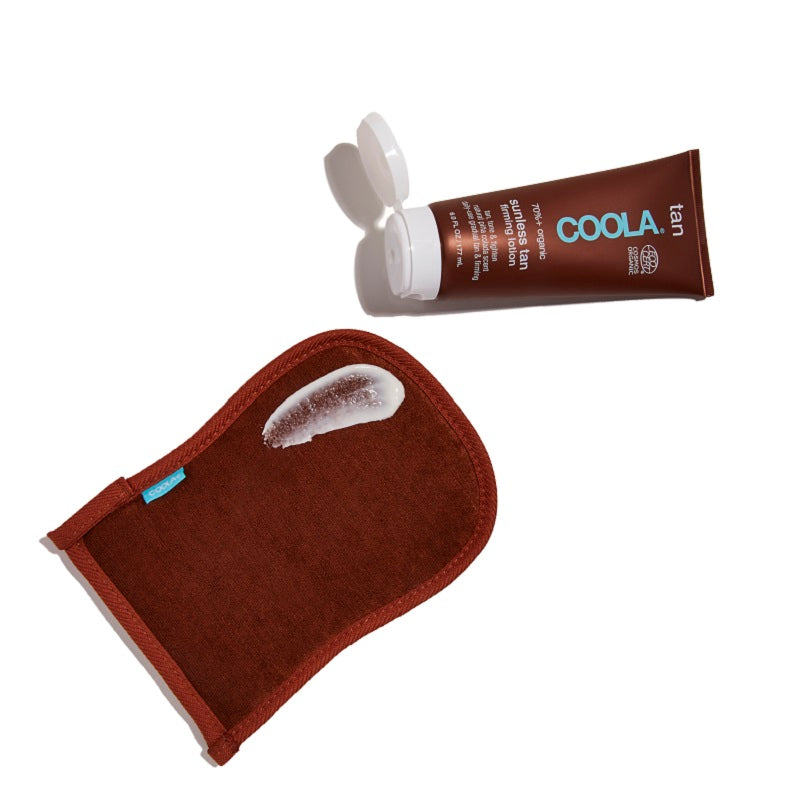
Can You Use Self Tanner While Pregnant? A Guide to Safely Using Self Tanner During Pregnancy
If you’re a future mom who wants to maintain their sunless glow, you’re probably wondering, "Can I use sunless tanner while pregnant?" You're not alone in this question. Pregnancy brings a whirlwind of changes, not just emotionally and physically, but also in the beauty routine department. COOLA is here to guide you through the world of self-tanning during pregnancy and see what's safe and what's not.
Sun-Kissed Skin 101: Understanding Self Tanners
First off, what exactly are self tanners? They're lotions, sprays, or mousses that give your skin that sun-kissed glow without the risks of UV rays. They work by reacting with the top layer of your skin, creating a temporary bronze that can boost your mood and confidence. But when you're expecting, it's natural to question if these products are safe.
Expecting and Glowing: The Safe Way to Self Tan While Pregnant
When it comes to self tanners and pregnancy, the overall consensus leans towards cautious optimism. The main active ingredient in most self tanners is dihydroxyacetone (DHA), a non-toxic substance that reacts with the cells in the outermost layer of the skin to produce a brown pigment called melanoidin.1 This process gives you that desired tan.
Importantly, DHA isn't thought to go beyond this outer layer of skin, meaning it isn't absorbed into the body and is unlikely to harm your baby.2 Most self tanners are considered safe as they act on the skin's surface without penetrating the deeper layers. However, being mindful of other ingredients in these products is still essential to ensure overall safety during pregnancy.
Ingredients Uncovered: What to Avoid in Self Tanners During Pregnancy
Navigating the world of beauty products during pregnancy can be a bit like being a detective, and you need to know what to look for on those labels. Here's a breakdown of some key ingredients to avoid in self tanners while expecting:
- Parabens: Often used as preservatives in cosmetics, parabens can disrupt hormone function, which is crucial to avoid during pregnancy. Studies have shown that some parabens can mimic estrogen, a hormone linked to breast cancer and reproductive issues.3
- Phthalates: These chemicals are used to increase the flexibility and strength of plastics, and are also found in some personal care products. They are known endocrine disruptors and have been linked to developmental issues in children.4
- Retinol (Vitamin A): While Vitamin A is essential for fetal development, excessive amounts can be harmful. Retinol in skincare products, especially in high doses, can lead to high levels of Vitamin A, potentially causing developmental issues in the fetus.5
- Formaldehyde and Formaldehyde Releasers: These chemicals, used in many cosmetic products as preservatives, are known carcinogens and can be absorbed through the skin. While the levels in cosmetics are typically low, it's best to avoid them during pregnancy.6
- Oxybenzone and Octinoxate: Commonly found in sunscreens, these chemicals can disrupt hormones. While they're less common in self-tanners, it's good practice to avoid them in all skincare products during pregnancy.7 COOLA prioritizes organic ingredients and healthier formulas, so out of an abundance of caution, we never use Oxybenzone and Octinoxate in any of our products.
- Dihydroxyacetone (DHA) in Aerosol Form: Although DHA is generally considered safe for topical use, it should be avoided in aerosol form (like in spray tans) as it could be inhaled, which might be harmful.8
By avoiding these ingredients, you can enjoy a safe, glowing tan while ensuring the best for your and your baby's health. Always consult with your healthcare provider for personalized advice, especially when it comes to products used during pregnancy.
Organic Glow: Understanding the Benefits of Organic Self Tanner During Pregnancy
When it comes to choosing a self tanner during pregnancy, going organic is a wise decision. But what does "organic" in skincare, particularly in self tanning products, really mean? Let's break it down.
Organic Skincare Explained
Organic skincare products, including self tanners, are formulated with ingredients that are grown and processed under a stringent set of agricultural guidelines. These guidelines typically forbid the use of synthetic pesticides, herbicides, and genetically modified organisms (GMOs). In self tanning products, this means the active ingredients, as well as the supporting ingredients, come from organic farming.9
Benefits of Organic Self Tanners
Safer Ingredients: Organic self tanners, like COOLA's Organic Sunless Tan Firming Lotion or the Organic Sunless Tan Anti-Aging Daily Moisturizer, are crafted with ingredients considered safe for pregnancy. We avoid harsh chemicals that might be found in non-organic tanners, reducing the risk of skin irritations or allergic reactions.
Nourishing Components: These products often include naturally derived ingredients like Hyaluronic Acid, Squalane, and Aloe Vera. Hyaluronic Acid is known for its hydrating properties, keeping the skin plump and moist. Squalane, derived usually from olives, offers superb moisturizing benefits without clogging pores. Aloe Vera, a well-known soothing agent, is excellent for sensitive skin, especially during pregnancy when skin sensitivity can increase.
No Harmful Additives: Organic self tanners typically do not contain parabens, phthalates, synthetic fragrances, or artificial colors. This minimizes the chances of exposing your developing baby to potentially harmful substances.
Eco-Friendly: By opting for organic, you're also making an environmentally friendly choice. Organic farming practices are designed to be sustainable and have a lower impact on the environment.
Why Choose Organic for Pregnancy
During pregnancy, your skin becomes more sensitive and susceptible to absorption. Choosing an organic self tanner means you're applying a product that's not only safe for you but also for your growing baby. These tanners provide a guilt-free glow, assuring you that you’re avoiding potentially harmful substances while still enjoying the benefits of a sunless tan.
Flawless Application and Maintenance: Mastering Self-Tanner with COOLA
Achieving and maintaining a perfect, streak-free tan with self tanner is both an art and a science. Let's dive into how you can get that radiant glow and keep it looking fresh with COOLA products.
Step 1: Flawless Application for a Radiant Glow
Start with the essential first step: exfoliation. COOLA's Sunless Tan 2-In-1 Applicator/Exfoliator Mitt iis perfect for creating an even canvas. This innovative mitt not only helps in evenly applying your tanner but also gently exfoliates your skin, ensuring a smoother application.
Step 2: Ensuring Long-Lasting Bronze
After achieving your beautiful, sunless tan, you might wonder about its longevity. How long does self tanner last? Typically, a self tanner's faux glow lasts about 5-7 days, but with the right care, you can extend its life and keep your skin looking fabulous.
To maintain that bronzed look, daily moisturization is key. Hydrated skin not only looks healthier but also holds onto the tan longer. This is where products like COOLA's Sunless Tan Luminizing Body Serum come into play. This serum not only gives your skin a luminous bronze but also hydrates deeply, thanks to its nourishing formulation. It’s an excellent choice for keeping your body’s skin glowing and moisturized.
For your face, COOLA’s Organic Sunless Tan Anti Aging Face Serum offers a dual benefit. It not only maintains the tan on your facial skin but also brings anti-aging properties to the table. Regular use of this serum ensures that your face retains its sun-kissed look while benefiting from ingredients that promote youthful, healthy skin.
Additionally, regular and gentle exfoliation is crucial before reapplying your self tanner. This step removes dead skin cells, providing a smooth canvas for an even application and helping to avoid patchiness as the tan fades. It’s especially important to exfoliate areas like elbows, knees, and ankles where skin tends to be dryer.
By following these steps and incorporating holistic products, you can ensure that your self-tan not only looks natural and beautiful but also lasts longer, keeping you glowing and confident throughout the week.
Step 3: Shelf Life and Product Care
Understanding the shelf life of your self tanner is crucial, especially during pregnancy. Does self tanner expire? Yes, like all beauty products, self tanners have a shelf life. Generally, they are good for about six months after opening. Using expired self tanner is not recommended, as the effectiveness can decrease, and it may not be safe for your skin.
With COOLA's expertly crafted products and these tips, you're all set to enjoy a safe, beautiful tan throughout your pregnancy and beyond. Remember, a little care goes a long way in preserving that sun-kissed, healthy glow!
Beyond the Basics: Exploring Sunless Tan Varieties for Pregnant Women
Aside from lotions and mousses, there are other forms of sunless tanning to consider. COOLA's Sunless Tan Luminizing Body Serum offers a shimmery alternative. If you're looking for something quick and easy, the Organic Sunless Tan Anti Aging Face Serum is a perfect pick-me-up for your facial skin.
Safe Tanning While Expecting: A Final Word on Self Tanners During Pregnancy
To wrap it up, the question "Can I use self tanner while pregnant?" has a reassuring answer: Absolutely, especially if you choose organic, natural ingredient-based products like those offered by COOLA. Each pregnant woman's skin is unique and can react differently, so it's always wise to do a patch test first and consult your doctor. This way, you can ensure not just safety but also the best care for your skin. Keep glowing safely with gentle and effective organic self tanners tailored for your unique skincare needs during this special time!
Sources:
- Petersen, Anita B et al. “Dihydroxyacetone, the active browning ingredient in sunless tanning lotions, induces DNA damage, cell-cycle block and apoptosis in cultured HaCaT keratinocytes.” Mutation research vol. 560,2 (2004): 173-86. doi:10.1016/j.mrgentox.2004.03.002
- Mother To Baby | Fact Sheets [Internet]. Brentwood (TN): Organization of Teratology Information Specialists (OTIS); 1994-. Self-tanners, Tanning Pills, Tanning Booths. 2021 Oct 1. Available from: https://www.ncbi.nlm.nih.gov/books/NBK582952/
- Pan, Shawn et al. “Parabens and Human Epidermal Growth Factor Receptor Ligand Cross-Talk in Breast Cancer Cells.” Environmental health perspectives vol. 124,5 (2016): 563-9. doi:10.1289/ehp.1409200
- Stahlhut, Richard W et al. “Concentrations of urinary phthalate metabolites are associated with increased waist circumference and insulin resistance in adult U.S. males.” Environmental health perspectives vol. 115,6 (2007): 876-82. doi:10.1289/ehp.9882
- Bastos Maia, Sabina et al. “Vitamin A and Pregnancy: A Narrative Review.” Nutrients vol. 11,3 681. 22 Mar. 2019, doi:10.3390/nu11030681
- National Cancer Institute. "Formaldehyde and Cancer Risk." National Institutes of Health, U.S. Department of Health and Human Services, 7 Jan. 2024, https://www.cancer.gov/about-cancer/causes-prevention/risk/substances/formaldehyde/formaldehyde-fact-sheet
- Rehman, Saba et al. “Endocrine disrupting chemicals and impact on male reproductive health.” Translational andrology and urology vol. 7,3 (2018): 490-503. doi:10.21037/tau.2018.05.17
- Wang, Yiying et al. “Assessing the respiratory toxicity of dihydroxyacetone using an in vitro human airway epithelial tissue model.” Toxicology in vitro : an international journal published in association with BIBRA vol. 59 (2019): 78-86. doi:10.1016/j.tiv.2019.04.007
- "Organic Skin Care: Benefits and What to Look for." Medical News Today, MediLexicon International, 7 Jan. 2024, www.medicalnewstoday.com/articles/organic-skin-care




